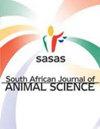Interaction of protein supplementation and ecotype on growth performance and carcass traits of Nguni goats
IF 0.6
4区 农林科学
Q3 AGRICULTURE, DAIRY & ANIMAL SCIENCE
引用次数: 0
Abstract
Nguni goats are thought not to respond to dietary protein supplementation. The objective of the study was to determine the interaction of protein supplementation and ecotype on growth performance and carcass traits of Nongoma, Msinga and Cedara Nguni goat ecotypes. Thirty-six five-month-old castrated males were randomly allotted to a 3 × 3 factorial design experiment and provided 0, 150 and 300 g protein concentrate per day. There was an interaction of ecotype and protein supplementation on average daily gain (ADG). The ADG of the Nongoma and Cedara goats increased with protein supplementation, but the Msinga ecotype was not affected by the treatments. Goats of the Cedara ecotype weighed 34.4 kg when provided 300 g of supplement, whereas the Nongoma ecotype weighed 26.5 kg at slaughter when unsupplemented. The dressing percentage did not differ with the level of protein supplementation or ecotype. From the fifth quarter, the skin was affected by ecotype, gut fill by protein supplementation and the weight of the head by both factors. The Cedara ecotype had a heavier fifth quarter at 300 g supplementation. There was no interaction of protein supplementation and ecotype on dissectible fat. Intestine and visceral fats were affected by protein supplementation, whereas stomach fat was affected by ecotype.蛋白质补充与生态型对恩古尼山羊生长性能和胴体性状的互作
恩古尼山羊被认为对膳食蛋白质补充没有反应。本试验旨在研究蛋白质补充和生态型对农格马山羊、Msinga山羊和塞达拉恩古尼山羊生态型生长性能和胴体性状的相互作用。选取36只5月龄阉割雄性随机进行3 × 3因子设计试验,每天提供0、150和300 g浓缩蛋白。生态型与蛋白质补充对平均日增重(ADG)有交互作用。添加蛋白质后,农马山羊和塞达拉山羊的平均日增重显著增加,而Msinga生态型山羊的平均日增重不受影响。当提供300克补充物时,Cedara生态型山羊的体重为34.4公斤,而在未补充时,Nongoma生态型山羊的屠宰体重为26.5公斤。屠宰率不随蛋白质添加水平和生态型而变化。从第5季度开始,皮肤受到生态型的影响,肠道填充受到蛋白质补充的影响,头部重量受到这两种因素的影响。雪松生态型在300克的补充下有更重的第五季度。蛋白质补充与生态型对可解剖脂肪无交互作用。肠道脂肪和内脏脂肪受蛋白质补充的影响,而胃脂肪受生态型的影响。
本文章由计算机程序翻译,如有差异,请以英文原文为准。
求助全文
约1分钟内获得全文
求助全文
来源期刊

South African Journal of Animal Science
农林科学-奶制品与动物科学
CiteScore
1.50
自引率
0.00%
发文量
39
审稿时长
>36 weeks
期刊介绍:
The South African Journal of Animal Science is an open access, peer-reviewed journal for
publication of original scientific articles and reviews in the field of animal science. The journal
publishes reports of research dealing with production of farmed animal species (cattle, sheep,
goats, pigs, horses, poultry and ostriches), as well as pertinent aspects of research on aquatic
and wildlife species. Disciplines covered nutrition, genetics, physiology, and production
systems. Systematic research on animal products, behaviour, and welfare are also invited.
Rigorous testing of well-specified hypotheses is expected.
 求助内容:
求助内容: 应助结果提醒方式:
应助结果提醒方式:


